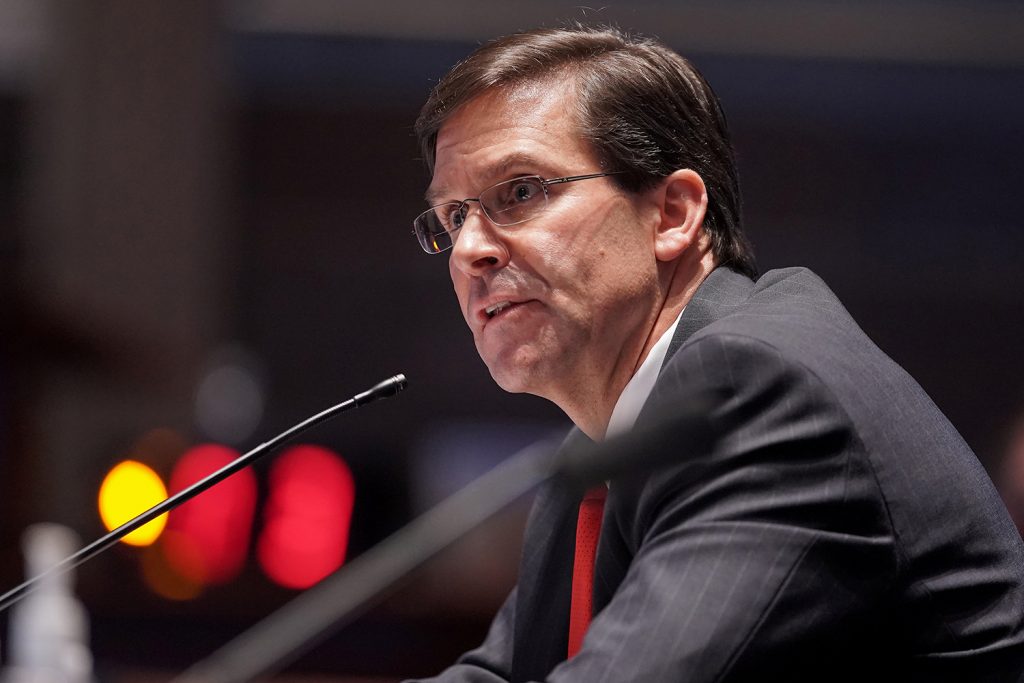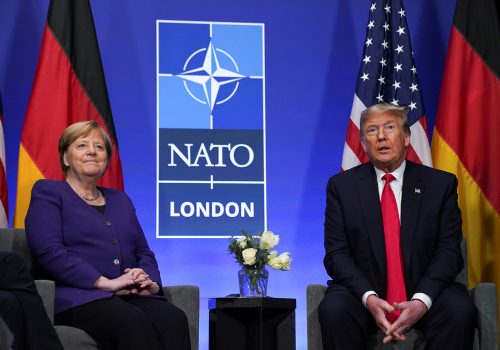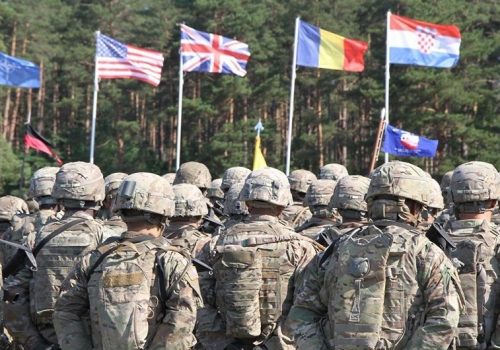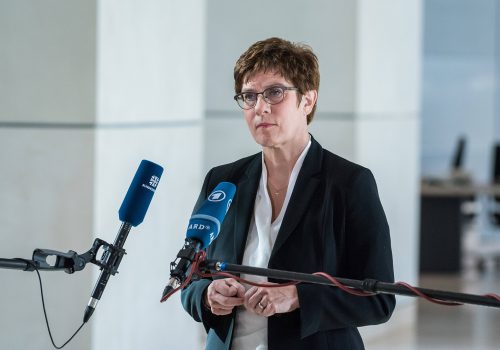After weeks of speculation over proposed US troop withdrawals from Germany at the urging of US President Donald J. Trump, US Secretary of Defense Mark Esper confirmed on July 29 that almost 12,000 US troops would soon leave Germany. Esper explained that the US presence in its NATO ally would drop from 36,000 to 24,000, with 5,600 of those troops being re-stationed to other NATO Allies.
The number of troops leaving Germany is higher than Trump’s June 15 pledge to withdraw 9,500 out of Germany, which Trump justified by arguing that Germany is not contributing enough to the cost of NATO forces—despite years of increased defense spending by Berlin. Trump’s initial June announcement drew considerable criticism from US lawmakers on both sides of the aisle for potentially weakening NATO and US capabilities in the region.
Esper and US European Command Commander General Tod D. Wolters detailed that in addition to the move out of Germany, EUCOM and Special Operations Command Europe would be moved to Mons, Belgium alongside NATO, an F-16 Air Force fighter squadron would redeploy to Italy, and there was a possibility that more troops could be shifted to Poland.
Atlantic Council experts responded to the Secretary Esper’s announcement of the US troop withdrawal from Germany. Here’s what they had to say.
Jump to an expert reaction:
Christopher Skaluba: The US is weakening its deterrence of Russia and paying the cost.
Daniel Fried: The least bad option is not much to celebrate.
Clementine Starling: The strategic case for the decision has not been made.
Sophia Besch: Some in Berlin still in wait-and-see mode.
Decentralizing US European defense posture might strengthen deterrence, but the geopolitical fallout and financial cost may outweigh the benefits.
“While much more remains to be learned about the US military posture changes announced today that would move significant US forces out of Germany, overall, the moves could be a net positive for operational purposes, but a net negative for important geopolitical objectives.
“Perhaps most importantly, we need to learn what the overarching global defense posture strategy is behind these moves. When I was in the Office of the Secretary of Defense helping to oversee the most sweeping changes in US global posture in decades in the 2004-2006 timeframe, we made those changes under the guidance of an overarching strategy and guiding principles that drove the specific types of posture changes that were undertaken. The strategic imperatives announced today (e.g., “strengthening deterrence of Russia”) are too general to be of much use in guiding specific force posture moves.
“Based on the fragmentary information currently available, the operational positives, if they indeed come to pass as part of a strategy-driven, cost-effective plan, could be noteworthy:
- Co-locating EUCOM HQs with NATO HQs—this could lead to increased synergy and efficiency and greater integration of US military policy with that of the Alliance. Location matters.
- Moving an F-16 squadron to Italy means that this unit would be closer to various warfighting theaters—the relocation would base the squadron a bit further from northern European contingencies, but closer to southeastern Europe (including the Black Sea region) and the Middle East. It’s also important to note that airpower can be relocated relatively quickly in a crisis.
- Rotating forces from CONUS to Poland including V Corps HQ—this could be seen as continuing to strengthen deterrence of Russian coercion or aggression in northern Europe significantly, provided that the rotational presence schedule is effectively designed and it actually comes to pass. The mighty V Corp headquarters is an important symbol but also would provide the kernel of command and control capability to help manage substantial ground combat operations (and thereby help deter such conflict through its presence).
- Rotating forces from CONUS to the Black Sea region to shore up deterrence—if this comes to pass, it could be significant—beefing up rotational force presence could strengthen deterrence in the under-appreciated and increasingly dangerous Black Sea region, where Russia has made advances and has standing military advantages. Investing more defense resources and capabilities in this critical region is an overdue and welcome effort.
“However, there are also geopolitical and fiscal negatives, which may end up being more important than the operational advantages. The most notable drawback appears to be the further diminishment of the critical US-German connection on the ground in Germany between permanently stationed US military forces and the German people and German forces in the heart of Europe. The United States should seek to leverage its forces’ presence where they are stationed to advance American soft power and values as well as hard power.
“Moreover, the United States military should station forces only where they are welcomed, and there is no doubt that US forces continue to be very much welcomed in Germany, the most powerful country in Europe. Moreover, the president’s statement that this reduction is in direct response to Germany “not paying their bills” is not a recipe for keeping this important ally as an ally. We can and should work through our differences in the level of resources devoted to defense, but removing forces from one of the most important countries in the world for such reasons runs contrary to the tangible advancement of US interests that those very forces’ geostrategic location contributes.
“Finally, these changes will cost billions of dollars in what is likely to be a much more difficult budgetary environment for the defense establishment over the next several years. (Importantly, these moves also will mean higher operational tempo for rotating forces, who will have to be away from their families more often than under the current posture). Should billions of dollars be devoted to enacting these measures, or are they better spent on other military or other national priorities in one of the most tumultuous geopolitical and domestic political periods in the nation’s history?
“In sum, overall, the decentralization of US European defense posture might strengthen deterrence in Europe by putting more capable forces at the frontiers of the NATO Alliance. However, the geopolitical impact of further weakening the US-German relationship, and the costs, could outweigh these potential operational gains.”
Barry Pavel, senior vice president and director of the Scowcroft Center for Strategy and Security at the Atlantic Council.
The US is weakening its deterrence of Russia and paying the cost.
“What I heard in public statements today were platitudes about supporting the National Defense Strategy, strengthening NATO, increasing deterrence of Russia, and reassuring Allies. What I failed to hear was one iota of evidence or analysis that explains how these redeployments do these things. In fact, on their face, the redeployments appear to do the opposite. Sending 6,000 US forces home from Europe while sending thousands of others from Germany to Belgium, Italy, and the UK will not cause Russian defense planners to lose sleep tonight. Ideas like rotational Stryker deployments, moving the lead element of the Army V Corps headquarters to Poland, or speculative missions to the Baltic or Black Sea states are more promising, but either so notional or so dependent of prerequisites (e.g. Poland concluding defense cooperation and burden-sharing agreements) to make them far from sure bets. Most concerning is the price tag, which is estimated to be in the single digit billions. That we are weakening deterrence of Russia while paying for the privilege is confounding in a budget environment that will see inevitable declines in defense spending because of COVID-19. Without significant cost savings, these plans make little sense.
“European force posture decisions since 2014, by both the Obama and Trump teams, were conducted methodically, in close consultation with Allies and the Congress, to increase deterrence of Russia. The results were positive and the Trump team can claim a modest policy legacy with respect to the readiness of NATO forces despite broader transatlantic tensions. Today’s announcement is tantamount to snatching defeat from the jaws of that victory. While I have no doubt that Secretary Esper and planners in the Pentagon and at EUCOM worked diligently to square the president’s decision to punish Germany with operational realities in Europe, it was an impossible task. We did not hear a convincing case today because there isn’t one. What we have are barely plausible rationales and notional promises at the cost of billions of dollars. Allies will be muted because there is little to be gained in protest, but they are decidedly not reassured. Which is, unfortunately, the point.”
Christopher Skaluba, director of the Transatlantic Security Initiative in the Atlantic Council’s Scowcroft Center for Strategy and Security.
The least bad option is not much to celebrate.
“There may be a strategic case for the withdrawal of almost 12,000 US troops from Germany, but Secretary of Defense Esper’s announcement today does not make it. In his July 29 statement, the secretary laid out five principles to guide US force deployments to suit the demands of “Great Power Competition”: enhance deterrence of Russia, strengthen NATO, reassure allies, improve US strategic flexibility, and take care of our service members and their families. Fair enough.
“It’s hard to see how pulling almost 12,00 troops out of Germany advances any of these goals. (Are any allies reassured by this?) The decision seems instead a rushed response to President Trump’s pique-driven desire to punish Germany for its relatively low but fast-growing level of defense spending (a rationale the president continues to repeat publicly).
“True, the deployment decisions could have been worse. Some of the other announced moves may be defensible, e.g., F-16s to Italy and lead elements of a new V Corps headquarters to Poland. But that’s just the Department of Defense and secretary trying to limit damage from an ill-considered Trump decision. Good for them. But that’s not much to celebrate.
“Making significant decisions on the basis of irritation with Germany and Trump’s apparent distain for Chancellor Angela Merkel is small minded.
“By contrast, let’s consider another initiative announced this week: on July 28, the Foreign Ministers of Poland, Lithuania, and Ukraine announced creation of the “Lublin Triangle” of cooperation, in significant part intended to support Ukraine’s European future. A lot has been said about nationalism in Central Europe. There is indeed plenty of bilateral (and nasty historical) issues between these countries. But instead of nursing national or bilateral grievances, the three governments are advancing cooperation for the sake of a common objective and a united Europe. Good job. And a lesson for the United States. Not great that this administration needs one.”
Daniel Fried, Weiser Family distinguished fellow at the Atlantic Council and former US ambassador to Poland.
The strategic case for the decision has not been made.
“The Secretary and military planners have tried to make sense of what is, ostensibly, a politically motivated move by the president to punish Germany over its lack of defense spending. However, the strategic case was not made convincingly today. While not all of the announcements are necessarily bad—additional forces to hotspots like the Black Sea region and Baltic States could strengthen our deterrence posture in important regions—the method and rhetoric surrounding the announcements is damaging to Alliance cohesion and politicizes decisions that should not be so.
“The rotation of US troops out of Europe, even if temporary, sends concerning signals to adversaries and European allies about deterrence, reassurance, and the US commitment. While some Allies may welcome the returns they receive from a newly divided US military force pie, it should not come at the cost of unity or the common defense of Europe. Pitting allies against each other in a transactional way is unhelpful.
“Germany is a strategically important US ally; the training locations, transport hubs, and command facilities there provide the United States and other allies with great value. The cost of moving and dismantling these will be high and will take time to implement. Greater clarity on the details is needed to assess the full impact of this new posture.
“The reevaluation of US force posture in Europe might well be worthy, but it should be deliberate, further our strategic aims, involve consultation with allies, and ideally not come with a heavy price. What we heard today didn’t sell that.”
Clementine G. Starling, deputy director of Forward Defense and resident fellow in the Transatlantic Security Initiative of the Atlantic Council’s Scowcroft Center for Strategy and Security.
Some in Berlin still in wait-and-see mode.
“In Berlin, reactions to the withdrawal discussion have consistently been (1) explaining US security interests back in Washington; (2) solemnly mourning the state of the transatlantic relationship; and (3) crossing fingers that the retreat won’t happen after all—even after today there are still wait-and-see voices, pointing especially to Congress’ role.”
Sophia Besch, nonresident senior fellow in the Atlantic Council’s Future Europe Initiative; senior research fellow at the Centre for European Reform.
Further reading:
Subscribe for events and publications on transatlantic security
Sign up for updates from the Atlantic Council’s Transatlantic Security Initiative, covering the debate on the greatest security challenges facing the North Atlantic Alliance and its key partners.

The Transatlantic Security Initiative, in the Scowcroft Center for Strategy and Security, shapes and influences the debate on the greatest security challenges facing the North Atlantic Alliance and its key partners.
Image: Secretary of Defense Mark Esper testifies during a House Armed Services Committee hearing on 'Department of Defense Authorities and Roles Related to Civilian Law Enforcement' in Washington, DC, U.S. July 9, 2020. Greg Nash/Pool via REUTERS



